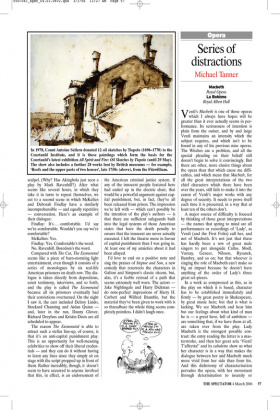Heavy-handed symbolism
Toby Young
The Cut Donmar The Exonerated Riverside Studios Steptoe and Son Comedy
There’s a scene in The Cut, a new play by Mark Ravenhill, that is so dull I came within a whisker of walking out. It occurs about halfway through and involves two actors — Ian McKellen and Deborah Findlay — sitting opposite each other at a dinner table and eating their supper. From the moment they begin to the moment they clear their plates, they exchange just one line. Dramatically, it’s about as exciting as standing outside a restaurant with your nose pressed to the window. After five minutes had elapsed, I began to wonder whether The Cut was going to continue in this vein indefinitely. Was this a brilliant piece of satire designed to demonstrate just how credulous the metropolitan elite can be when it comes to serious drama? How long would the audience remain in their seats? Alas, I was too cowardly to leap to my feet. The best I could manage was to turn to my companion and whisper that in the next scene, if we were lucky, we might get to watch paint dry.
The Cut is so staggeringly bad, it’s almost entertaining. Almost. McKellen plays the faceless official of an unnamed country whose job consists of performing an unspecified surgical procedure on members of the criminal underclass. Is it a vasectomy? A lobotomy? No, it’s a piece of heavy-handed symbolism designed to illustrate the oppressive nature of the modern state. To call The Cut ‘Pinteresque’ doesn’t do justice to Ravenhill’s earnest duplication of almost every trope in the Nobel Prize winner’s theatrical playbook. It’s more like a fawning homage, a reverential tribute.
Ravenhill is the author of Shopping and Fucking and Mother Clap’s Molly House and, until now, he’s been thought of as an ‘in-yer-face’ playwright, a phrase coined by the critic Aleks Sierz that usually denotes plenty of swearing and male nudity. The Cut, by contrast, is a work of high modernism. As far as I can tell, it’s an attempt by Ravenhill to be taken more seriously.
Needless to say, there’s no discernible plot. It opens with a confrontation between McKellen and Jimmy Akingbola, a black prisoner who actually wants his captor to go to work on him with his scalpel. (Why? Has Akingbola just seen a play by Mark Ravenhill?) After what seems like several hours, in which they take it in turns to repeat themselves, we cut to a second scene in which McKellen and Deborah Findlay have a similarly incomprehensible — and equally repetitive — conversation. Here’s an example of their dialogue: Findlay: It’s ... comfortable. I’d say we’re comfortable. Wouldn’t you say we’re comfortable?
McKellen: Yes.
Findlay: Yes. Comfortable’s the word. No, Ravenhill. Boredom’s the word.
Compared with The Cut, The Exonerated seems like a piece of barn-storming light entertainment, even though it consists of a series of monologues by six real-life American prisoners on death row. The dialogue is taken directly from depositions, court testimony, interviews, and so forth, and the play is called The Exonerated because all six prisoners eventually had their convictions overturned. On the night I saw it, the cast included Delroy Lindo, Stockard Channing and Aidan Quinn and, later in the run, Danny Glover, Richard Dreyfuss and Kristin Davis are all scheduled to appear.
The reason The Exonerated is able to attract such a stellar line-up, of course, is that it’s an anti-capital punishment play. This is an opportunity for well-meaning celebrities to show off their liberal credentials — and they can do it without having to learn any lines since they simply sit on stage with the script propped up in front of them. Rather incredibly, though, it doesn’t seem to have occurred to anyone involved that this, in effect, is an endorsement of the American criminal justice system. If any of the innocent people featured here had ended up in the electric chair, that would be a powerful argument against capital punishment, but, in fact, they’ve all been released from prison. The impression we’re left with — which can’t possibly be the intention of the play’s authors — is that there are sufficient safeguards built into the legal systems of those American states that have the death penalty to ensure that the innocent are never actually executed. I left the theatre more in favour of capital punishment than I was going in. At least one of my anxieties about it had been allayed.
I’d love to end on a positive note and sing the praises of Steptoe and Son, a new comedy that resurrects the characters in Galton and Simpson’s classic sitcom, but, alas, it’s a feeble retread of a path that seems extremely well worn. The actors Jake Nightingale and Harry Dickman do note-perfect impressions of Harry H. Corbett and Wilfred Bramble, but the material they’ve been given to work with is so threadbare the whole thing seems completely pointless. I didn’t laugh once.











































































 Previous page
Previous page